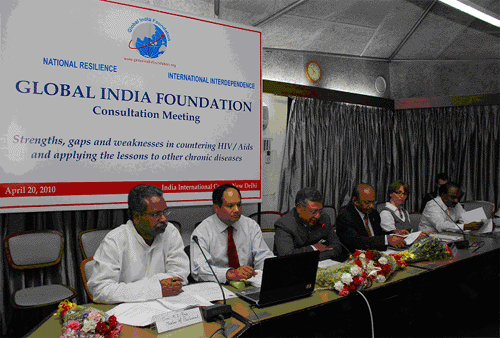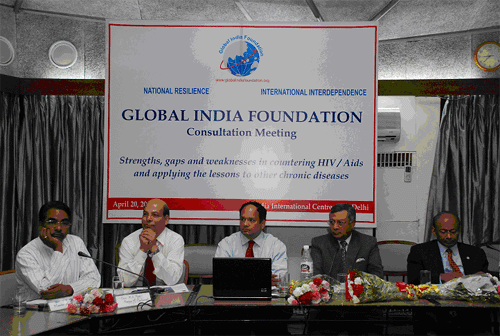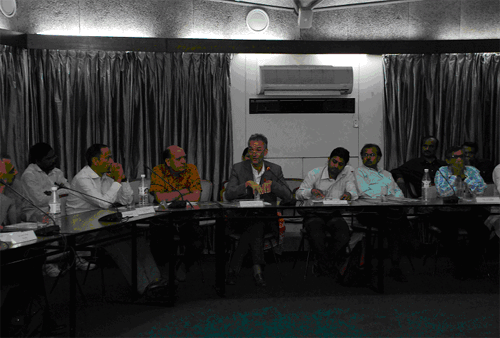
|
|
Report on GIF Round Table Consultation: “Strength, Gaps and Weaknesses in Countering HIV/AIDS and Applying the Lessons to other Chronic Diseases,” Global India Foundation organized a Round Table Discussion on 20th April 2010 at the India International Centre. This two hour conference on HIV/AIDS and Chronic Diseases was chaired by Dr. Arun Chockalingam, Director, Office of Global Health at the National Heart Lung and Blood Institute (NHLBI) of the United States National Institutes of Health (NIH) and Admiral P.J. Jacob, Chairman, Global India Foundation. The Chief Guests were Shri. K. S. Rao, Member of Parliament and Shri J.D. Seelam, Member of Parliament and General Secretary of the Forum for Parliamentarians on HIV/AIDS. The discussion was moderated by Dr. Sunil Chacko, Vice President for North America and Japan, Global India Foundation, and Professor of Health Sciences at Simon Fraser University, Vancouver, Canada. At the start of the conference, Admiral Jacob welcomed the speakers and guests and spoke briefly about the Foundation and the subject before handing over to Dr. Sunil Chacko who covered the threat of HIV/AIDS and set the ground for drawing parallels between HIV/AIDS and Chronic Diseases. He demonstrated how the response to HIV/AIDS saw a gradual increase between 1981 and 2000 and a thereafter a sharp increase in funding and attention after the creation of UNAIDS and the Global Fund after which the world wide spending on HIV/AIDS increased to the level it is today ($10 Billion). Since 1981 over 25 million have died of HIV/AIDS. A similar trend is visible in the world’s response to Chronic Diseases which accounts for 50% deaths in the world and receives only 3% of the global health spending. HIV/AIDS is also similar to other chronic diseases as a significant proportion of those afflicted are not aware that they are suffering from the disease. There is low rate of testing for HIV/AIDS and other Chronic Diseases. Both in the case of HIV/AIDS and Chronic Diseases, focus should be on prevention, as in most cases the chances of effective treatment diminish as the diseases advance. Nevertheless, awareness of HIV/AIDS has spread greatly because of community advocacy and involvement of patient organizations which can be applied to chronic diseases. India can use its increasing influence in the G-20 to show the way for affordable health care, and health research in terms of new medicines, diagnostics and vaccines, and especially on cost-effective treatment options. This being the 20th anniversary of the Nobel Conference on Health Research for Development at which the Report of the Harvard-based Commission on Health Research had been presented, the event also commemorated the Nobel Conference. Dr. Chacko recalled the Commission of which he was the Assistant Director, and called for sustained support for health research through innovative mechanisms. Following Dr. Chacko, Hon. Mr. K.S. Rao, Member of Parliament and Member of the Parliamentarians Forum for HIV/AIDS spoke briefly about the Government of India’s commitment to health, admitting that there are several areas in the public health care system in India where there is a lot to be desired. However with the commitment of the government and the research community, we can move towards achieving the goal of health for all and parliamentarians in India are committed to providing universal health care. Dr. Arun Chockalingam then invited Dr. D. Prabhakaran, Professor and Director of the Centre for Chronic Disease and Control, New Delhi and Dr. Dennis Xavier, a Professor at St. Johns Medical College, Bangalore to speak about their research findings on chronic diseases in India. Their institutions were selected by U.S. NIH as the two participants for a new research and training program of the NHLBI. Dr. Arun Chockalingam the presented a report on ‘Promoting Cardiovascular Health in the Developing World: A Critical Challenge To Achieve Global Health’ by The Institute of Medicine (I.O.M.) of the US National Academy of Sciences. He had been a member of that prestigious I.O.M. Panel. He highlighted the impact of chronic diseases in low and middle income countries especially on the earning capacity and savings of a person. Several issues at the policy level deflect health priorities away from chronic diseases which should change because of the high impact of Chronic Diseases on morbidity.
Shri K.S. Rao (Member of Parliament and Secretary FPA), Dr. Sunil Chacko (GIF), Admiral P.J. Jacob (GIF), Dr. Arun Chockalingam (Director, Global Health, NHLBI, United States National Institutes of Health), Dr. Cristina (United States National Institutes of Health), Dr. D.P. Prabhakaran (Director, Centre for Chronic Diseases Control) Dr. Charles Gilks, India Country Director of UNAIDS, spoke about the challenges of HIV/AIDS and encouraged activists and researchers of chronic diseases to apply lessons on data collection and annual global reporting on statistics, updates and progress from HIV/AIDS. Dr. T.P. Ahluwalia of ICMR spoke about the health infrastructure in India and current areas that the government needs to focus on especially to improve health care in rural areas.
Shri J D Seelam (Member of Parliament and Secretary, Forum for Parliamentarians on HIV/AIDS), Prof Omprakash Mishra (GIF), Dr. Sunil Chacko (GIF), Admiral P. J. Jacob (GIF), Dr. Arun Chockalingam (Director, Global Health, US National Institutes of Health’ National Heart Lung and Blood Institute) Shri J.D. Seelam, Honourable Member of Parliament highlighted the government’s commitment to HIV/AIDS and other pressing health care issues in the country. Other members present submitted their observations and comments. Prof. A.N. Basu of Global India Foundation, and a former Vice Chancellor of Jadavpur University, spoke about the value of education in confronting pandemics. Mr. D.C. Pathak of the Global India Foundation, a former Chair of the Govt. of India’s Joint Intelligence Committee, reiterated the value of analysis and research on HIV/AIDS in the context of India becoming a prominent member of the G-20, and cited the puzzling statistics of Washington DC having a higher HIV/AIDS prevalence rate than badly affected countries in Sub-Saharan Africa. He endorsed the work underway to learn from the HIV/AIDS experience and apply to other chronic diseases prevention. Dr. S.K. Harikumar, Global India Foundation’s national consultant on HIV/AIDS highlighted learning from the HIV/AIDS programs in stronger states in order to apply to the rest of the country, and for prevention of other chronic diseases.
Professor Monirul Hussain (GIF), Dr. T.P. Ahluwalia (ICMR), Dr. Charles Gilks (India Country Program Director, UNAIDS), Mr. Jalaluddin (Basic Foundation), Dr. Prabhas Sinha (GIF), Prof. A N Basu (GIF) All participants
present felt the time allocated for the topic was insufficient,
and Professor Omprakash Mishra, Member Secretary of the Global India
Foundation committed to organizing more such conferences on a larger
scale in the future. [Home] |
|
©
Global India Foundation |
||


